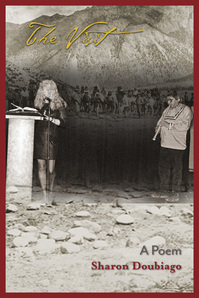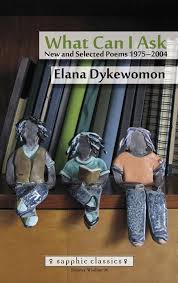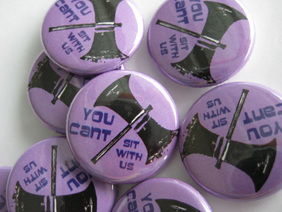
Period.
So now, I come to a consideration of my friend Sharon Doubiago’s recent, powerful and brilliant long poem, The Visit.
The Visit is not just written in the gray area; it is a kind of cartographic experiment in the mapping of that contested terrain.
 Goldschmidt's portrait being removed from the Oregon State Senate
Goldschmidt's portrait being removed from the Oregon State Senate Doubiago is also writing about so much more. She is writing about Neil Goldschmidt, former governor of Oregon, who sexually abused the thirteen-year-old daughter of one of his campaign workers. The abuse went on for years, officially ending when the girl became legally recognized as an adult at seventeen, but the dynamic continued until she was twenty-seven. By the time his crime was exposed, the statute of limitations had run out.
Doubiago is also writing about her own father, who raped her at seven and who continued to sexually abuse her until she was twelve and reported it to her mother. She has written a compelling, two-volume memoir about this relationship: My Father’s Love: Portrait of the Poet as a Young Girl, and My Father’s Love: The Legacy, Portrait of the Poet as a Woman.
 Michael Dorris
Michael Dorris She writes about the mass execution of aboriginal children at the Mohawk Residential School in Ontario.
She writes about the torture and murders of teenaged girls Jennifer Esson, Kara Leas, Sheila Swanson, and Melissa Sanders… their bodies found in the Oregon woods.
She writes about how US soldiers scalped the vulvas of Native women in the Sand Creek Massacre. She writes about Megan Kanka, the raped and murdered seven-year-old after whom “Megan’s Law” was named. Megan’s Law, which was applied to Retasket--no parole, no probation.
Doubiago is not glossing over the horror. She is not apologizing or justifying. Even, as I write these sentences, I sense my resistance to believing that a gray area is possible. There are only two columns in my ledger and I am itching to move those sentences to the victim column or the perpetrator one. Not because I fancy myself a judge. But because I am terrified of becoming complicit (again?) in my own abuse. I am terrified of deconstructing boundaries that I excavated with literally bleeding and self-mutilated hands, and then built from the ground up against the Sisyphean forces of self-doubt and shame.
 On the road
On the road … to know your enemy is temporarily insane
as in Aikido, the Japanese spiritual practice
of defending the self while at the same time
protecting the attacker from injury
in his temporary insanity
to find freedom as a woman
to fold not to the fear…
In the ninth section of the poem, “The Last Time I Saw Him,” she writes of the murdered teenaged girls:
this tied naked to the tree
freezing, reliving
your stupid little mistake, just
getting into his truck
to prove
you don’t mistrust him
Those lines strike a nerve. In my younger years, I hitchhiked. And I did it a lot. I needed to prove that I could. I needed to have those precious years of vagabonding so seminal (yes, seminal) to the later oeuvre of male writers like Gary Snyder, Jack Kerouac, Eugene O’Neill, Tennessee Williams. I would insist on having those years. But, of course, I didn’t; I couldn’t. Because, as the protagonist of my play Crossing the Rapelands narrates, “… when a young woman stands on the side of the road and sticks out her thumb, she automatically enters the Rapelands. And wherever she may think she’s going, it’s always the Rapelands.”
Or, in the words of activist and author Roxanne Dunbar-Ortiz, “Men have always gone on the road or off to sea without consequences. They are heroes from Ulysses to Kerouac. A woman who ventures forth on a quest is considered a deserter.”

getting into his truck
to prove
you don’t mistrust him
Yes, I did that. Not for their sake, but to prove something to myself, to the world. Gray. Painfully gray. Not victim-blaming. I gambled. I survived. But, no, I never had the freewheeling Kerouackian adventures, filled with bravado and brio. On the other hand, my decade of traveling behind enemy lines did forever change my perspective and the direction of my writing.
I realize about my mother
culture’s silence and denial
my sister, our girls not mourned
all the girls every day down through time
every day of my girlhood, a girl dead in the paper
stuffed in trash cans, car trunks, dumped along the LA river.
Sharon Doubiago loved her father, and she never reported his crimes to the authorities. And neither did her mother.
 Sharon Doubiago
Sharon Doubiago never to lose it. My proving
I don’t mistrust you.
That paranoia… the price of abstaining from judgment, the civil cost of “innocent until proven guilty.” The gray just this side of "beyond the shadow of a doubt."
Here is where I engage with the Poet. I refuse the burden of that paranoia. I have opted for a compassion-ectomy. Yes, the excision of that organ may compromise the heart or limit my humanity, but what of the Spirit? Has compassion, like other organs, evolved for the preservation of the gene pool, indifferent to the suffering of individual females, because our evolutionary function is, after all, egg-carrier and incubator. Compassion for our enemies, the inseminators, will inevitably facilitate that all-important access that perpetuates the species. I distrust my instinct for compassion. It has betrayed me too many times.
In excruciatingly honest detail and the heightened language of a master poet, Doubiago chronicles atrocity after atrocity in her paradoxical quest to resolve her feelings for Retasket. The Visit is a revisit to the landscape of her childhood. The evidence against men, against males, against this particular male is overwhelming for this reader.
Doubiago quotes survivor and novelist Rafael Iglesias:
It was 20 years after I was sexually misused before I understood what my molester had actually done to me: he had permanently associated my first experience of sexual pleasure with my having no say in the matter. That, I believe, is the true meaning of rape.

Gray. Again.
Doubiago’s poem activates my fragmented selves. My jury room comes alive. There are those of me who can’t remember, who pore over names and dates looking for clues of what happened to them. There are those of me who got into his truck… maybe as many as 500 times, and over 10,000 miles. They look down at their shoes, at their tough little hiking boots… confused. There are those who married a good, a safe man… and those who made us leave him. There are those who, like Madame DeFarge, keep their own counsel through the proceedings, knitting peacefully in the corner. And there are those who understand that she is coding the names of perpetrators in her knitting, names slotted for the guillotine. And once that reign of terror begins, will any of us be safe?
My friend Sharon invites every single one of my shattered selves to the table. She gives us all the floor. And she has left us some jury instructions, specifically, the definition of “amnesty”--forgiving, not forgetting.
The deliberations go on longer than the poem. They’re still going on, or hadn’t you noticed? I believe that Doubiago is counting on a hung jury, a retrial. But, for better or worse, I am gunning for a conviction.





 RSS Feed
RSS Feed
